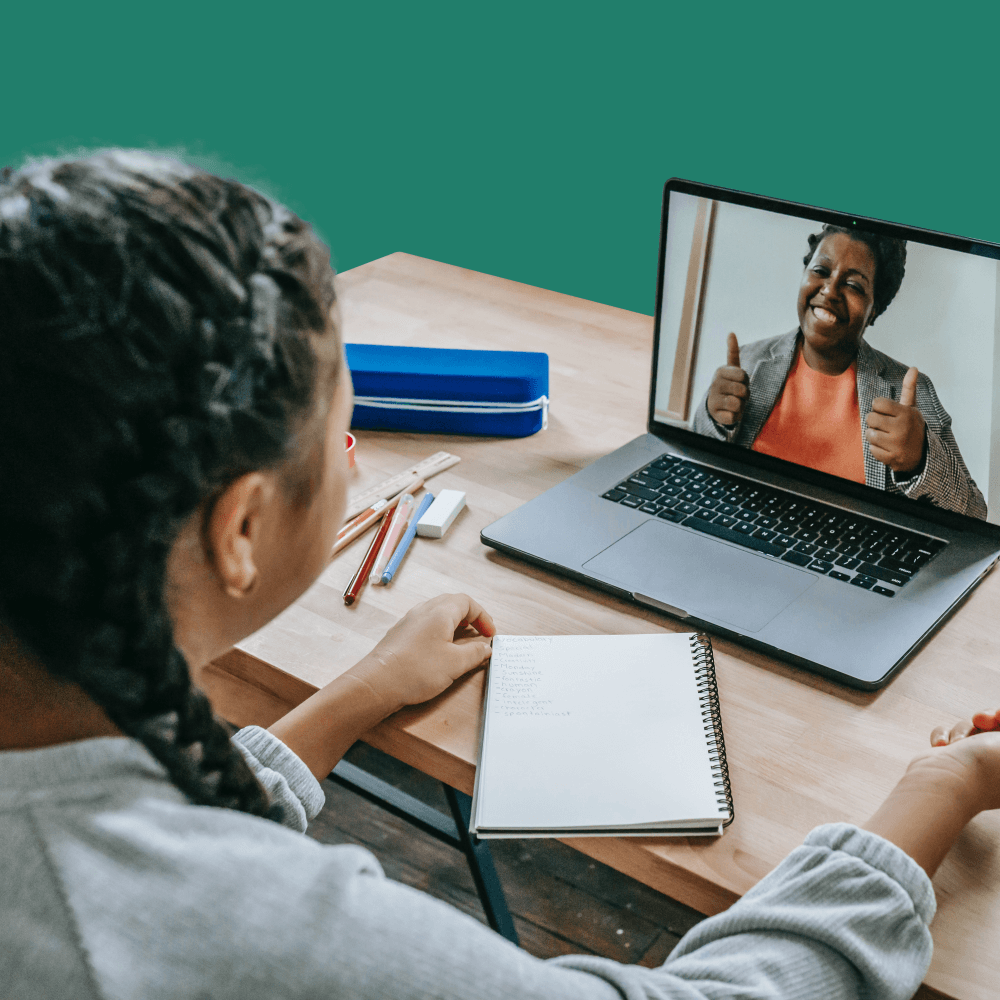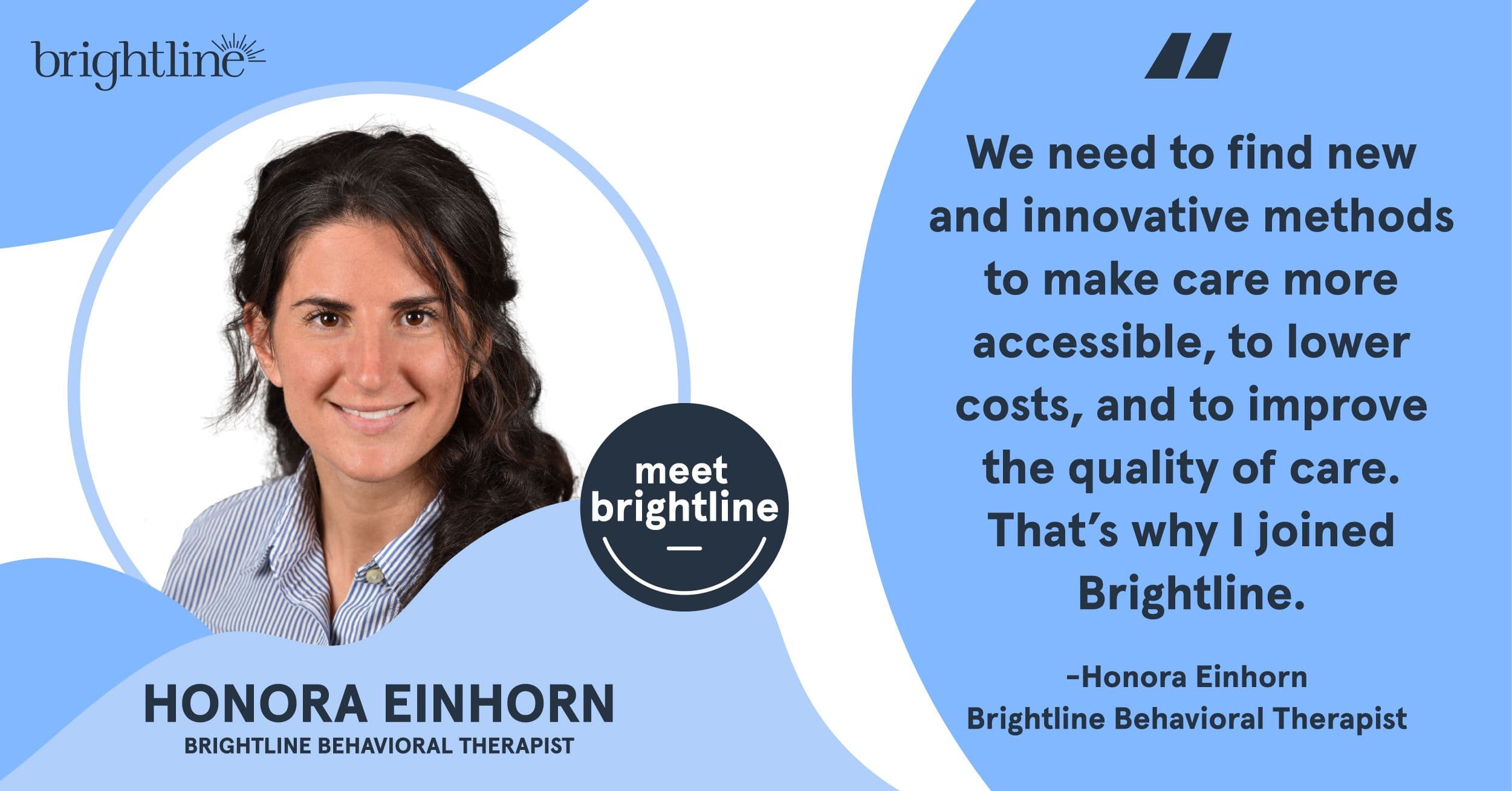
Therapy vs. Coaching: Which one is best for kids and families?

By Brightline team, Nov 2, 2021
Studies show lack of access to care is at the heart of the mental health crisis in the U.S. In fact, according to Brightline’s Pediatric Behavioral Health Needs Survey, more than half of parents who seek support for children with behavioral health challenges don’t receive all the help they need, with 12% receiving no support at all, despite seeking it.
Brightline behavioral therapist Honora Einhorn has seen the challenges working families face up close. While working with marginalized youth at Boston Children’s Hospital, Honora witnessed how social stigmas, bureaucratic clutter, and scant resources conspire to block kids from getting much needed care.
In this interview, Honora talks about her passion for mental health equity, as well as her optimism about the collaborative approach to pediatric behavioral health at the heart of Brightline.
You’re a longtime advocate for mental health equity. How did you become so passionate about this crucial issue early in your career?
I’ve always been interested in the way people think and behave, but my curiosity took a more specific turn when I began working with youth living with developmental disabilities while I was in middle school. Then in undergrad, I explored child development and psychology, with a research focus on supporting the emotional health of youth living with Prader-Willi Syndrome, as well as other youth living with neurodevelopmental disabilities.
In graduate school I worked in a global mental health lab, looking at what mental health looks like in other socio-cultural contexts. I collaborated on a paper on unaccompanied immigrant youth. That experience, among others, inspired me to think more about how psychology, social justice, and public health and policy related to each other.
Once I got to Boston Children’s Hospital, I served as mental health director for a program supporting youth living with or at risk of acquiring HIV. During this time, I learned a great deal from peers and colleagues about stigma and shame, as well as the power of community organizing and restorative justice. All of these affect behavioral health.
Ultimately, I found we have a deeply flawed system when it comes to pediatric behavioral health. We need to find new and innovative methods to make care more accessible, to lower costs, and to improve the quality of care. That’s why I joined Brightline.
How is behavioral health care different for children?
What is critical and unique to pediatric behavioral health is that you’re not simply treating or supporting one child, you’re treating them within their community. We know through clinical research as well as anecdotal reporting that care is most effective when it involves parents, family members, caregivers, and others in the child’s life. We also want to include teachers or administrators and the child’s peer network. And then you have the healthcare teams — the pediatricians or specialists who are supporting the child and family.
Plus, kids often have co-occurring or evolving concerns. One child could be experiencing a motor tic disorder in combination with attention deficit/hyperactivity disorder (ADHD) in combination with generalized anxiety, alongside a nonverbal learning disability. That requires a team-based approach and coordination among the adults supporting the child. We must also consider the development and constant growth of kids, since a six-year-old child will need different care than a high school senior.
In short, no child is an island. Each one is supported by a village. So in thinking about pediatric behavioral health care, we need to think more as a village or city. A collaborative approach that supports growth and development is essential.
Can you describe how Brightline takes a more collaborative approach?
That’s one area where Brightline differs from other providers — we can coordinate with other adults and stakeholders in a child’s life. First, we work as an internally collaborative team, offering a unique ability to seek peer consultation and share in the care of a child. Our team includes certified behavioral health coaches, who can support many areas of subclinical concern and distress, often supporting families in skill-building, navigating stressors and supporting prevention.
In addition, our clinical team is composed of behavioral therapists, speech therapists, and prescribing providers. We can facilitate collaboration for clinical, outpatient concerns with ease and skill.
We also work with parents to identify others in the child’s life who are critical to supporting the child, whether that’s a pediatrician, therapist, teacher, or guidance counselor. As a digital platform, we can easily send out release forms and other tools to protect health information while cooperating seamlessly. At Brightline, I’ve been able to hold care meetings with school administrators, teachers, counselors, and parents with the speediest turnaround I’ve ever experienced.
Is Brightline’s offering significantly different from what you’ve experienced in past positions?
Yes, very much so! And a lot of that has to do with accessibility. I’m operating out of Massachusetts, where there are many mental health resources, and still, patients and families have to wait months or more to see a therapist or other clinical care provider. At Brightline, we are trying to close that gap by not only offering fast access to providers, but also making virtual care available wherever families are.
Beyond accessibility, Brightline’s unique that our treatment is outcomes-focused. Validated measures of effectiveness are integrated into treatment and documentation. And in addition to the clinical care, Brightline gives families access to behavioral health coaches, webinars, and self-guided content to support kids in multiple ways.
You have a lot of experience working in the intersection between mental health and social justice — caring for kids who have been marginalized by their race, HIV status, or other factors. How has that informed your work at Brightline?
This is a complicated question to answer. My past experiences have informed my path forward in many ways, reaffirming that I want to engage in work that considers the complexity of behavioral health needs for youth coming from a diversity of experiences and identities with awareness and compassion. In short, I must hold myself accountable to work toward continuous growth and development in this area, and practice cultural humility.
When I consider how I wish to support young people experiencing marginalization, inequity and oppression, I know I must also engage in critical self-reflection as a white cisgender female. If I’m dismissive of differences, I risk people feeling unsafe, invalidated, and at worst, traumatized. So I try to enter these conversations with humility and transparency, and Brightline’s own diversity, equity, and inclusion initiatives help cultivate that kind of respect.
As Brightline expands to new states, I’m hoping to serve as a behavioral health advocate in as many spaces as I can! I hope to meet each child and family where they are, offer resources and care that is backed by research, and make space for differences and resilience in all its forms.
Brightline is in a position to move mountains for the benefit of pediatric behavioral health. We’re at the beginning of something that has a chance to create new models for how we care for and support the mental health needs of children and teens. I’m so excited to be a part of that.
Honora Einhorn is a behavioral therapist at Brightline. She holds a Bachelor of Science in child development and research psychology from Vanderbilt University, a Master of Arts in Clinical Psychology from Columbia University, and a Master of Social Work from Boston College. A lifelong advocate for the psychological health and well-being of marginalized youth, she has more than 10 years of experience supporting children, adolescents, and young adults through empirically based behavioral health interventions and programming.